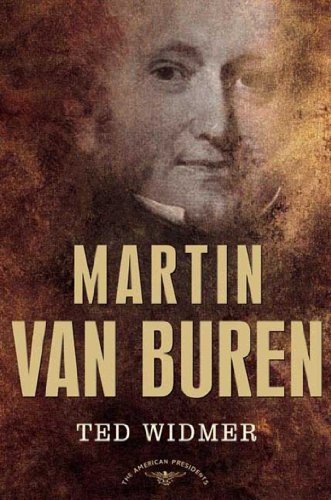
Martin Van Buren - American Presidents Series
Ted Widmer
reviewed April 2016
Recently I added to my bucket list the task of reading at least one biography of every U.S. President. Finding such works on the older, more obscure presidents is not an easy task. Van Buren was the nation’s 8th president, and probably the first who has somewhat faded into insignificance. By the time he took office, the nation really was no longer ‘new’ anymore, so the excitement of reading about the birth of the colonies had somewhat faded. He wasn’t even born until the 1780s.
Fortunately, ‘The American Presidents’ series has set out to ensure that all of the minor players receive their due diligence in history. This book isn’t a cookie cutter hack job, but neither is it a series lengthy retrospective that would take a scholar years to research and write. In fact, author Ted Widmar is very honest about this in the book’s introduction. He confesses that such an epic would probably be an insurmountable task since we don’t really have too many records about the man. So the book is less than 200 pages.
This isn’t a criticism. In fact, I felt the length was appropriate. Sure, there’s an awful lot about the man and his life that we don’t learn about, but being rather insignificant compared to his peers, such detail seems inconsequential. We’re told, for example, that there are basically no memorabilia nor records of his first wife (who died before he ever took office), so we learn her name and when and how she died. That’s about it.
We learn that Van Buren was heavily involved in local politics in his home state of New York. He comes across as someone who is quiet, but very smart. He’s not necessarily a great orator, but he knows how to pull strings, form alliances, and advance his career. In other words, he’s an excellent politician. As he becomes more of a player on the national field, he’s widely regarded as the man responsible for the two-party system in politics. It’s easy to now look at this and think that this is something that our country shouldn’t want, but history shows us otherwise. It’s too lengthy to describe why this is the case in a book review, but careful study shows us that such a system does much more good than harm, and makes the ongoing character attacks and back stabbing not quite as abrasive. If you can somehow believe that.
As Van Buren moves up the political ladder, he forms a friendship and alliance with Andrew Jackson, his immediate predecessor. He becomes Jackson’s Vice President. We’re led to believe that the main reason Van Buren is coddling up to him is that he wants Jackson’s job, and is skillfully playing his cards. He’s successful and becomes the nation’s 8th Commander in Chief in 1837.
Two events then immediately occur that damage his tenure. The first is the nation’s first tumultuous financial depression – referred to as The Panic of 1937. The second is that the issue of slavery is finally brought up to the forefront of people’s minds and consciousness. It seems this barbaric institution can no longer be ignored and hidden in the basement. The financial crisis was the first the young country had ever experienced, so needless to say, there was a big learning curve in how to deal with such a travesty. Starving people are generally not patient. So it shouldn’t surprise us that Van Buren gets the blunt of the blame even though the crisis begins a mere six weeks into his term.
The slavery issue was much more complex. Sadly, we mostly see politicians during this time sitting on the fence. If any take a strong view, pro or con, they essentially alienate the other half of the country and its voting population. So Van Buren’s views are common for the day. He doesn’t like the institution (good) but chooses to not take any action since the problem will eventually ‘fix itself’ (bad). Not surprisingly, he’s only a one term president.
Overall, the author Ted Widmer does a very good job trying to make a somewhat boring subject interesting. He had a lot of colorful quotes, observations, and anecdotes throughout the book, and for such a small tome, I found that I littered the pages with highlights from a yellow marker. Sometimes, though, the author goes a bit too far with his exorbitant details. I remember one instance where he described a person in this biography as ‘a character from a Gabriel Garcia Marquez novel’. I seriously doubt that most readers of this bio have ever read anything by Marquez, and I would also bet more than half of them don’t even know who the man was. Another instance: he describes a particular scene in the book as something that ‘Aaron Spelling’ would be proud of.
Who??
I had to Wikipedia the guy. It turns out that Aaron Spelling is a Hollywood Producer or something. Couldn’t the author have just said ‘Hollywood Producer’? Maybe I’m just not up on my pop culture, but it seems like these tidbits such as this would show up frequently. Again, though, such padding was probably necessary.
I really enjoyed this book. If you’re like me and want to read about all of the famous figures in American History, I certainly can’t find any fault with what is presented here. Although the books in this series on the lesser known presidents are written by many different authors, I’m looking forward to the next time I ‘have to’ pick one of these up due to limited options.
Go to the Next Review
Back To Main Page
E-mail your thoughts and opinions to Clem: clem@clemsmusicreviews.com